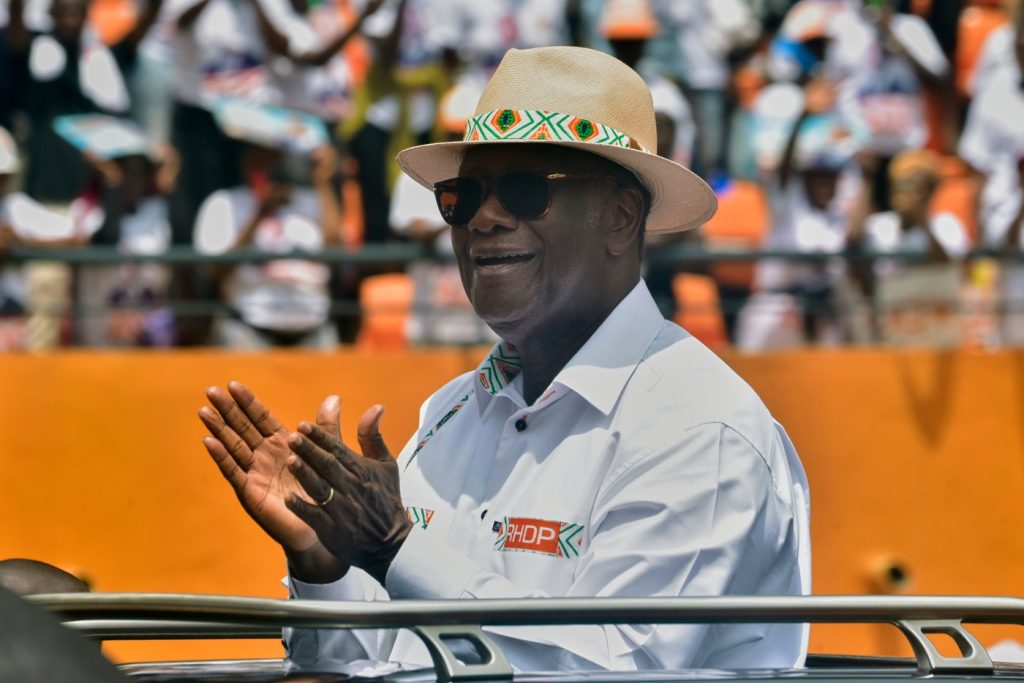ABIDJAN, Ivory Coast (AP) — Placide Konan, a 33-year-old slam poet in the capital city of Abidjan, has been utilizing his shows to address the political climate surrounding President Alassane Ouattara’s fourth-term bid in the upcoming election. With the poll set for Saturday, Konan expresses deep frustration over the prevailing hardships within the country, which, despite being one of West Africa's economic powerhouses and home to the world’s largest cocoa production, grapples with significant inequality and a poverty rate of 37.5%. Over 75% of the population is under the age of 35, further illustrating the urgent need for change.
“People can no longer make ends meet,” Konan stated. “You have to be very lucky, or a bit of a magician, to be able to live comfortably,” he remarked about life in the bustling port capital, which will host the 2024 Africa Cup of Nations. Analysts predict that the 83-year-old Ouattara is likely to secure victory and prolong his reign, which began in 2011. Key opposition figures such as former Credit Suisse CEO Tidjane Thiam have been disqualified from running. A local court deemed Thiam ineligible under Ivorian law due to his French nationality, a decision he claims was unjust after renouncing his citizenship earlier this year.
In the presidential race, Ouattara will face weakened opposition from four candidates, including Jean-Louis Billon, a former commerce minister, and Simone Gbagbo, a former first lady. This election reflects a troubling trend of long-serving African presidents increasingly at odds with their youthful citizenry. Amidst fears of potential violence, approximately 8.7 million individuals are registered to vote, with past elections marred by violence leading to unrest.
The disqualification of key opposition leaders has sparked protests that authorities have attempted to suppress aggressively. Hundreds have been arrested, and some have faced imprisonment. The government has also restricted public gatherings and deployed over 40,000 security personnel across the nation. Reports indicate at least three fatalities attributed to the unrest. Critics allege that the government has manipulated legal provisions to undermine opposition efforts and that the final list of candidates is unfair. Ouattara has denied any intention to target opposition members.
Political analyst Paul Melly from Chatham House warns that ongoing tensions could destabilize the country, particularly as Ivory Coast, like other nations in West Africa, confronts substantial challenges. Ouattara ascended to power following a violent political crisis in 2010-2011 when former President Laurent Gbagbo refused to accept electoral defeat, resulting in nearly 3,000 deaths.
Ouattara is dismissing calls to relinquish power, asserting that his pursuit of a fourth term is essential due to "unprecedented security, economic, and monetary" challenges the nation faces. In a recent appeal to younger voters, he pledged to create opportunities to foster independence and entrepreneurship. He previously claimed victory in a contentious third term in 2020, which was followed by significant unrest claiming nearly 100 lives, according to human rights organizations.
Supporters of Ouattara highlight a relatively flourishing economy, significant infrastructure development, and increased public sector investment, attributing these advancements to rising government revenues and foreign investments. The World Bank reported a 6% economic growth rate in 2024. “If you left Côte d'Ivoire to live abroad for a few years and came back today, you would not recognize your neighborhood,” said Abidjan hairdresser Assita Karamoko, expressing her support for the president.
Despite improvements, Melly notes the gap between economic growth and job creation for youth remains significant. Security concerns continue to mount as Ivory Coast borders the conflict-ridden nations of Mali and Burkina Faso, facing threats from armed groups seeking to penetrate coastal West Africa. While the Ivorian military is regarded as one of the region’s most capable forces, the deteriorating stability in neighboring countries poses escalating challenges for Ivory Coast. “The security conditions are fragile and exposed in the north of the country,” Melly emphasizes, framing the situation as a consequence of prevailing regional dynamics rather than solely a domestic failure.











